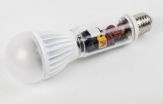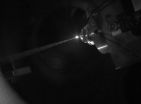(Press-News.org) The instant gratification and the pleasure derived from consuming excessive chocolate and deep-fried foods can lead way to a double-edged sword of negative consequences ranging from weight gain to feelings of low self-esteem. According to a new study in the Journal of Consumer Research, combating this type of self-destructive behavior may be achieved simply by making a person feel sad.
"We found that when people who are sad are exposed to pictures of indulgent food or indulgent words, their sadness highlights the negative consequences of indulging and encourages them to indulge less," write authors Anthony Salerno, Juliano Laran (both University of Miami), and Chris Janiszewski (University of Florida).
In a series of five experiments, the authors studied the behavior of participants who were exposed to either indulgent or neutral words or images and then made to feel sad. In one study, participants were asked to either look at a series of print ads that featured pleasurable foods like pizza and chocolate cake or to look at neutral print ads featuring products like washing machines and electric cars. Immediately after viewing the print ads, the participants were asked to complete a writing task that made them feel sad. At the end of the study, the participants were given the opportunity to eat indulgent foods like M&M's or chocolate chip cookies.
Study results showed that when people were first exposed to pleasurable information and then made to feel sad, they decreased their consumption of indulgent foods. The authors also found that these participants were more likely to indicate how consuming indulgent foods could lead to health problems. In contrast, when people were exposed to neutral information and made to feel sad, they increased their consumption of indulgent foods.
"Our research has important implications for consumers, particularly as obesity remains a major health concern in the United States. For brands looking to understand what triggers help and hinder people in their ability to eat healthy foods, we provide insight into when sadness might aid consumers in becoming less prone to indulging in unhealthy foods on a daily basis," the authors conclude.
INFORMATION:
Anthony Salerno, Juliano Laran, and Chris Janiszewski. "Hedonic Eating Goals and Emotion: When Sadness Decreases the Desire to Indulge." Journal of Consumer Research: June 2014. For more information, contact Anthony Salerno or visit http://ejcr.org/.
What's the upside of feeling too sad for chocolate?
2014-03-11
ELSE PRESS RELEASES FROM THIS DATE:
Restoring order in the brain
2014-03-11
Alzheimer's disease is the most widespread degenerative neurological disorder in the world. Over five million Americans live with it, and one in three senior citizens will die with the disease or a similar form of dementia. While memory loss is a common symptom of Alzheimer's, other behavioral manifestations — depression, loss of inhibition, delusions, agitation, anxiety, and aggression — can be even more challenging for victims and their families to live with.
Now Prof. Daniel Offen and Dr. Adi Shruster of Tel Aviv University's Sackler School of Medicine have discovered ...
Time versus money? Placing a value on buyer's remorse
2014-03-11
From a product's price to its convenience, ease of use, and number of overall features, many factors play into getting the most "bang for your buck." According to a new study in the Journal of Consumer Research, when it comes to weighing tradeoffs, selecting something more expensive based on perceived value might lead to buyer's remorse in the long run.
"We propose that when making an immediate decision between complexity and convenience, consumers believe that products with more features and functions represent higher value, even if the complex product might lead to ...
Power play: Empowered consumers are more likely to switch brands
2014-03-11
As consumers, we form favorite brands and select services providers from a plethora of choices. According to a new study in the Journal of Consumer Research, how powerful we feel in our daily lives may impact our likelihood of switching favorites, trying something new, or both.
"Our research examines the impact of a person's perceived sense of power on their likelihood to switch products or brands," write authors Yuwei Jiang, Lingjing Zhan (both Hong Kong Polytechnic University), and Derek D. Rucker (Kellogg School of Management, Northwestern University).
Over six ...
Gene therapy for lysosomal storage disease shown to be safe and well tolerated
2014-03-11
New Rochelle, NY, March 11, 2014—Several young children suffering from a severe degenerative genetic disease received injections of therapeutic genes packaged within a noninfectious viral delivery vector. Safety, tolerability, and efficacy results from this early stage clinical trial are reported in Human Gene Therapy, a peer-reviewed journal from Mary Ann Liebert, Inc., publishers. The article is available on the Human Gene Therapy website.
Marc Tardieu, Université Paris-Sud and INSERM, and a team of international researchers administered the adeno-associated viral (AAV) ...
Cancer cells don't take 'drunken' walks through the body
2014-03-11
Because of results seen in flat lab dishes, biologists have believed that cancers cells move through the body in a slow, aimless fashion, resembling an intoxicated person who cannot walk three steps in a straight line. This pattern, called a random walk, may hold true for cells traveling across two-dimensional lab containers, but Johns Hopkins researchers have discovered that for cells moving through three-dimensional spaces within the body, the "drunken" model doesn't hold true.
This finding, reported in the March 4 online Early Edition of Proceedings of the American ...
Research consortium identifies predictors of successful ACL reconstruction
2014-03-11
Tuesday, March 11, 2014 Cleveland: Researchers have found that a patient's age and the type of tissue graft have a direct impact on ACL reconstructive surgery (ACLR) outcomes, according to an exhibit presented March 11 at the 2014 American Academy of Orthopaedic Surgeons (AAOS) annual meeting in New Orleans.
Researchers from Cleveland Clinic and six other member institutions will present findings on surgical reconstruction of anterior cruciate ligaments from the Multicenter Orthopaedics Outcomes Network (MOON), led by Cleveland Clinic's Kurt Spindler, M.D., principal ...
Anesthetic technique improves quality of recovery for women having breast cancer surgery
2014-03-11
TORONTO, March 11, 2014 – Anesthesiologists using a technique similar to a dental freeze can improve the quality of recovery and decrease recovery time for breast cancer surgery patients, according to a new study.
The study, from researchers at St. Michael's Hospital and Women's College Hospital, was published in the March edition of Anesthesiology. It is the world's first randomized control trial for breast cancer surgery that compares the use of ultrasound-guided paravertebral blocks – a local anesthetic freezing that blocks breast nerves – to general anesthetic. The ...
LED lamps: Less energy, more light
2014-03-11
Incandescent light bulbs are now banned in the EU, while energy-saving lamps remain a bone of contention. In 2016, it will be lights out for halogen bulbs over 10 watts as well. LEDs (light-emitting diodes) therefore have the best chance of becoming the light source of the future. Experts reckon that LED retrofit lamps for use in standard bulb fittings will overtake traditional energy-saving bulbs for the first time from 2015. By 2020 it is predicted that LEDs will have captured between 88 and 90 percent of the lighting market. The tiny diodes offer a whole host of advantages ...
X-ray laser FLASH spies deep into giant gas planets
2014-03-11
This news release is available in German.
The atmosphere of gas giants consists mainly of hydrogen, which is the most abundant chemical element in the universe. "We have very little experimental knowledge about the hydrogen in the interior of such planets," says Zastrau. "This is despite our very good theoretical models." The researchers therefore decided to use cold liquid hydrogen as a sample of the planetary atmosphere. "Liquid hydrogen has a density that corresponds to that of the lower atmosphere of such giant gas planets," explains Zastrau. The scientists ...
Cosmetic treatment can open the door to bacteria
2014-03-11
Many people have 'fillers' injected into their facial tissue to give them 'bee-stung lips' or to smooth out their wrinkles. Unfortunately, a lot of cosmetic treatment customers experience unpleasant side effects in the form of tender subcutaneous lumps that are difficult to treat and which - in isolated cases - have led to lesions that simply will not heal. Research recently published by the University of Copenhagen now supports that, despite the highest levels of hygiene, this unwanted side effect is caused by bacterial infection.
Injections of fillers were previously ...



